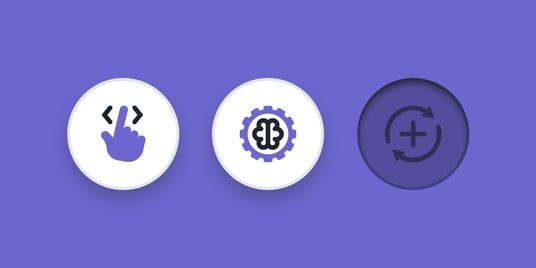Gartner has routinely listed artificial intelligence and machine learning among their top emerging skills for application development. But considering that an estimated 85% of AI projects fail to deliver on their goals, it’s clear that many software development organizations are struggling to understand what skills actually help their teams harness the power of intelligent technologies.
The journey to quality engineering is a prime opportunity for software testing teams to adopt AI and machine learning solutions, as intelligent capabilities can reduce the burden of test maintenance, help QA build testing strategies for new features, and ensure that tests are only run when the application reaches the correct state. With the right AI skills, quality engineers can maximize these features for data-driven testing that supports DevOps adoption, accelerates product velocity, and contributes to happier customers.
Real-World AI and Machine Learning Fundamentals for QA Engineers
As important as artificial intelligence and machine learning are to the future of software development and quality engineering, most QA professionals are too busy to become AI experts overnight. Their rapidly expanding role already entails embracing data-driven software testing, improving test coverage, and expanding test automation strategies to include API and mobile web testing. To maximize their time, effort, and skillset, QA teams are better served by mastering key AI and machine learning fundamentals that will enable them to start embracing advanced testing techniques as quickly as possible.
Understand “Good” Data: Data Science 101
As the saying goes: garbage in, garbage out. Understanding what ‘good’ data means is fundamental to anyone implementing AI and machine learning in their quality engineering practice. Software testing, particularly a high-impact testing strategy that uses both manual and automated testing, will produce vast amounts of data that can be used to improve product quality, identify opportunities for better development practices, and train AI solutions. An understanding of basic data science will help AI-eager software testers source, clean up, and utilize good data in their quality engineering efforts.
As they build their knowledge, quality engineers can use their new data science skills to audit their existing software testing strategies for optimal data outputs, making their practices more efficient and easing the transition to automated testing. Auditing an automated testing strategy with a data science mindset ensures both the quality and accuracy of testing data: QA professionals can verify that tests aren’t broken, that they’re measuring the most relevant customer journeys, and covering high-risk points like APIs. Knowing what good data looks like is essential for quality engineers adopting AI and machine learning in their organizations.
Interpreting Impact: Data and Trend Analysis
Similarly, anyone starting to develop their AI and machine learning skills should understand how to interpret the information produced by algorithms. Intelligent test automation platforms are helping quality engineering teams embrace a proactive approach to product quality with comprehensive reporting features. These in-depth reports enable software testers to monitor long-term performance trends, spotting quality concerns like slower loading times well before customers are affected. When issues are identified earlier, they’re easier to fix, and quality engineering teams can operate in a more agile manner that supports continuous improvement.
To fully take advantage of intelligent test automation platforms, quality engineers should have a basic understanding of how the solution creates reports. Where is the data sourced? How did the solution learn the norms and standards used to grade performance? How is different data weighted for different metrics? Being able to answer these questions will help quality engineers interpret trends and educate the rest of the software development organization on quality priorities.
Empowering Software Testing Teams with Machine Intelligence
When implemented successfully, AI and machine learning can help quality engineering teams expand testing to include cross browser, mobile web, and API testing without adding unsustainable amounts of test management tasks. As automation embeds itself deeper in the software development life cycle, quality engineers can maximize their time and skills with machine learning basics that empower them to harness the full potential of AI and machine learning.
Start exploring the potential of test automation with mabl’s 14 day free trial, where intelligent features like autohealing tests, Intelligent Wait, and page coverage reports make it easy to improve test coverage while accelerating testing.





